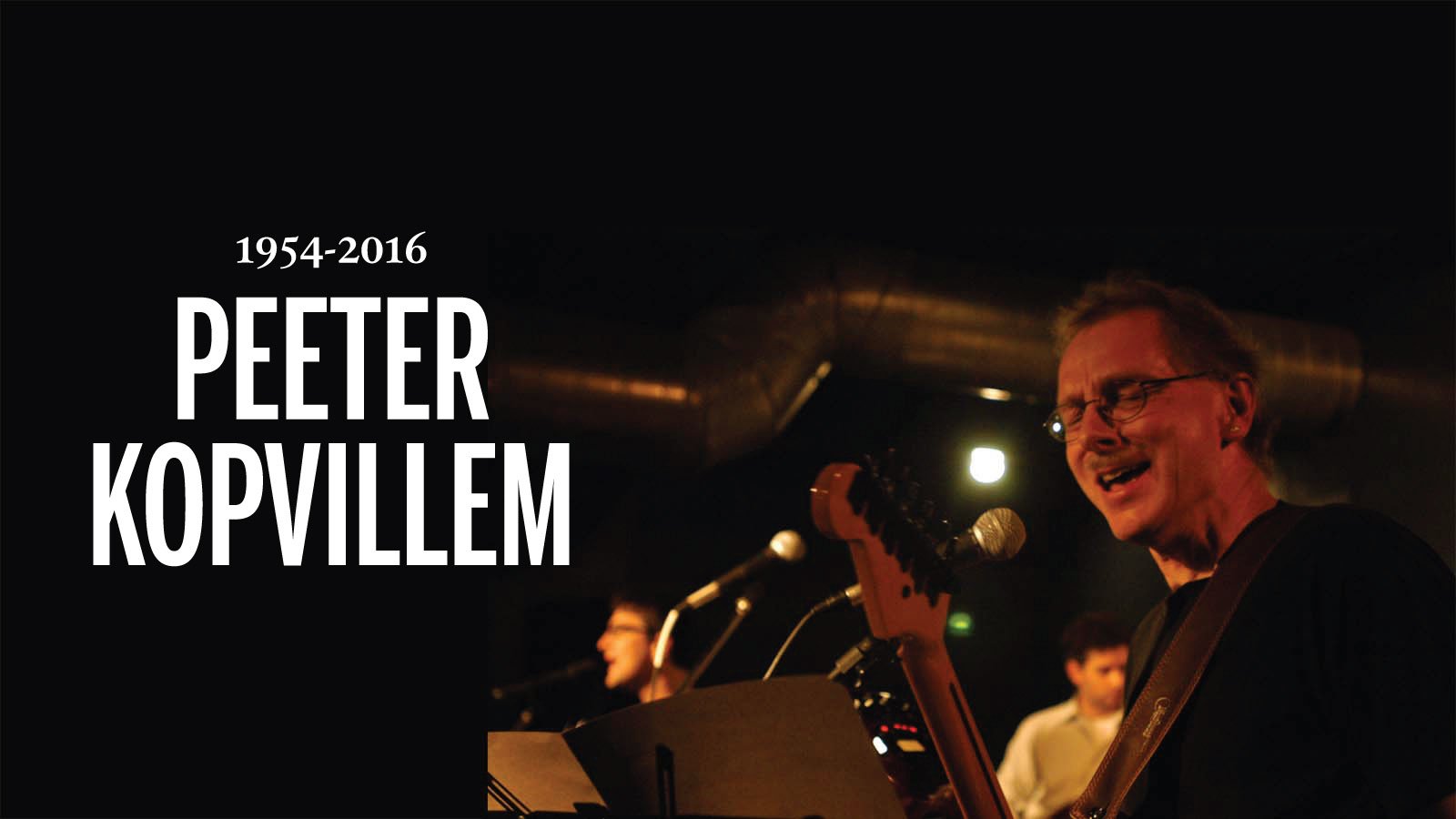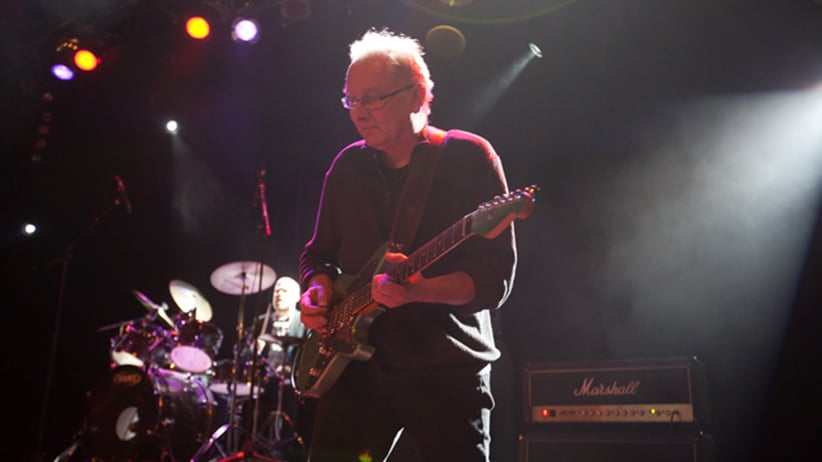Gita Kalmet remembers Peeter Kopvillem
Estonia’s ambassador to Canada on a lifetime knowing Peeter’s devotion to his home country
Peeter Kopvillem perform, circa 2003. (Photograph by Peter Bregg)
Share

When former Maclean’s senior executive editor Peeter Kopvillem died, we lost a tremendous editor, a fine musician and a generous man. Gita Kalmet, Estonia’s ambassador to Canada, reflects on Kopvillem’s life as a beloved Estonian who always remained devoted to his home country.
If I said that I’ve known Peeter only for a short time and also that I’ve known him for a lifetime, both claims are true. As a child on the other side of the Iron Curtain, I heard on a crackling vinyl record, which despite censorship somehow had reached Tallinn, the humorously sarcastic songs of Peeter’s father, Olaf Kopvillem. I really can’t say when exactly in time Olaf’s voice became Peeter’s voice.
My brief encounters with Peeter and his music bring to mind two thoughts: inspiration and humility. Both are rare guests in our superficial copy-and-paste age.
I once heard someone mention Peeter’s song, We’ll Reach the Shore One Day. I didn’t know the song, but its title weighed on my mind. It did so until I realized that it was a metaphor; a metaphor about the desire of we Estonians to exist and survive. Even though I have always thought that we now have reached the shore, we really have not yet… we may be quite close to the shore, perhaps in very shallow waters, just about on a dry land already, but our heels are still not firmly planted on the ground. We still have the feeling that a tidal wave may come at any time and sweep us away or at least pull us back far off shore. That is what we felt in the spring when Russia took Crimea.
I didn’t realize that the feeling was within me, that I and my whole generation too, was born with that feeling. Peeter knew that perpetual feeling of insecurity. What else could he be thinking when he told one of his colleagues at Maclean’s that depression was his birthright as an Estonian.
When you got together and were in close contact with Peeter, you had to be your true self. Without titles. It forced you to pull yourself together, but it was also truly liberating. You could breathe in and out and be yourself, if you dared.
The manner in which Peeter accepted the decoration of the President of Estonia is a story in itself. During my career I have seen more than enough false humility: “Oh, I really don’t deserve this …” Peeter simply said the decoration meant a lot to him and that he was grateful. Serenely. No superlatives. Yet I felt I had never before experienced such gratitude. True humility cannot be learned. Estonia meant a great deal to him.
We’ll reach the shore one day. I don’t know if Peeter has now reached the shore. Perhaps on the contrary, he has set off from shore and hoisted his sails. May the wind be at your back, Peeter!

Kui ma ütlen, et olen tundnud Peetrit lühikest aega ja teadnud kogu elu, siis on mõlemad väited õiged. Lapsena, sealpool raudset eesriiet, kuulsin kahisevalt vinüülplaadilt, mis tsensuuri kiuste oli kuidagi Tallinna jõudnud, Peetri isa – Olaf Kopvillemi sarkastilisi kuplette. Ma ei oskagi täpselt määratleda, millal aja jooksul Olafi häälest sai Peetri hääl.
Põgusatest kokkupuudetest Peetri või tema loominguga seostuvad mul märksõnadena – inspiratsioon ja alandlikkus. Mõlemad harvad külalised meie pealiskaudsel copy-paste ajastul.
Kuulsin kord kedagi nimetamas Peetri laulu „Ükskord me jõuame randa“. Ma ei teadnud seda laulu, aga pealkiri jäi vaevama. Vaevas nii kaua kuni sain aru, et see on metafoor. Meie eestlaseks olemise ja meie kesta tahtmise metafoor. Et kuigi olen kogu aeg mõelnud, et nüüd me oleme randa jõudnud, siis tegelikult me ei ole… me võime olla rannale päris lähedal, võib-olla väga madalas vees, peaaegu kuival maal juba, aga me ei ole veel surunud oma kandu tugevalt maasse. Meil on ikka see tunne, et tõusulaine võib tulla kohe ja meid rahvana minema pühkida, või kui mitte seda, siis kanda rannast tagasi kaugele. See oli tol kevadel kui Venemaa võttis Krimmi.
Ma ei teadnud, et ka minus on see tunne olemas, et ka mina olen sündinud selle tundega, et ka minu põlvkond… Peeter teadis seda. Alatist ebakindluse tunnet. Mida muud ta mõtles, kui ühele Macleansi kolleegile ütles, et depression, was his birthright as an Estonian.
Related: Peeter Kopvillem, 1954-2016
Peetriga kokku puutudes, tema lähedal, pidid olema tõeline, sina ise. Tiitliteta. See pani ennast kokku võtma, aga oli ka tõeliselt vabastav. Võisid hingata sisse ja välja ja olla see, kes sa oled. Kui julgesid.
See, kuidas Peeter võttis vastu EV presidendi teenetemärgi on omaette kõrgem pilotaaž. Olen oma tööelus näinud piisavalt palju võlts-tagasihoidlikkust, et oh, mis nüüd mina … Peeter ütles lihtsalt, et see teenetemärk tähendab talle palju ja et ta on tänulik. Ülivõrreteta. Rahulikult. Ja ometi on mul tunne, et sellist tänulikkust pole ma varem kogenud. Tõeline alandlikkus ei ole õpitav, seda valdavad vähesed. Eesti tähendas talle nii palju.
Ükskord me jõuame randa. Ma ei tea, kas Peeter on nüüd randa jõudnud … pigem vastupidi, tõukunud rannast ja heisanud purjed … Head pärituult, Peeter!